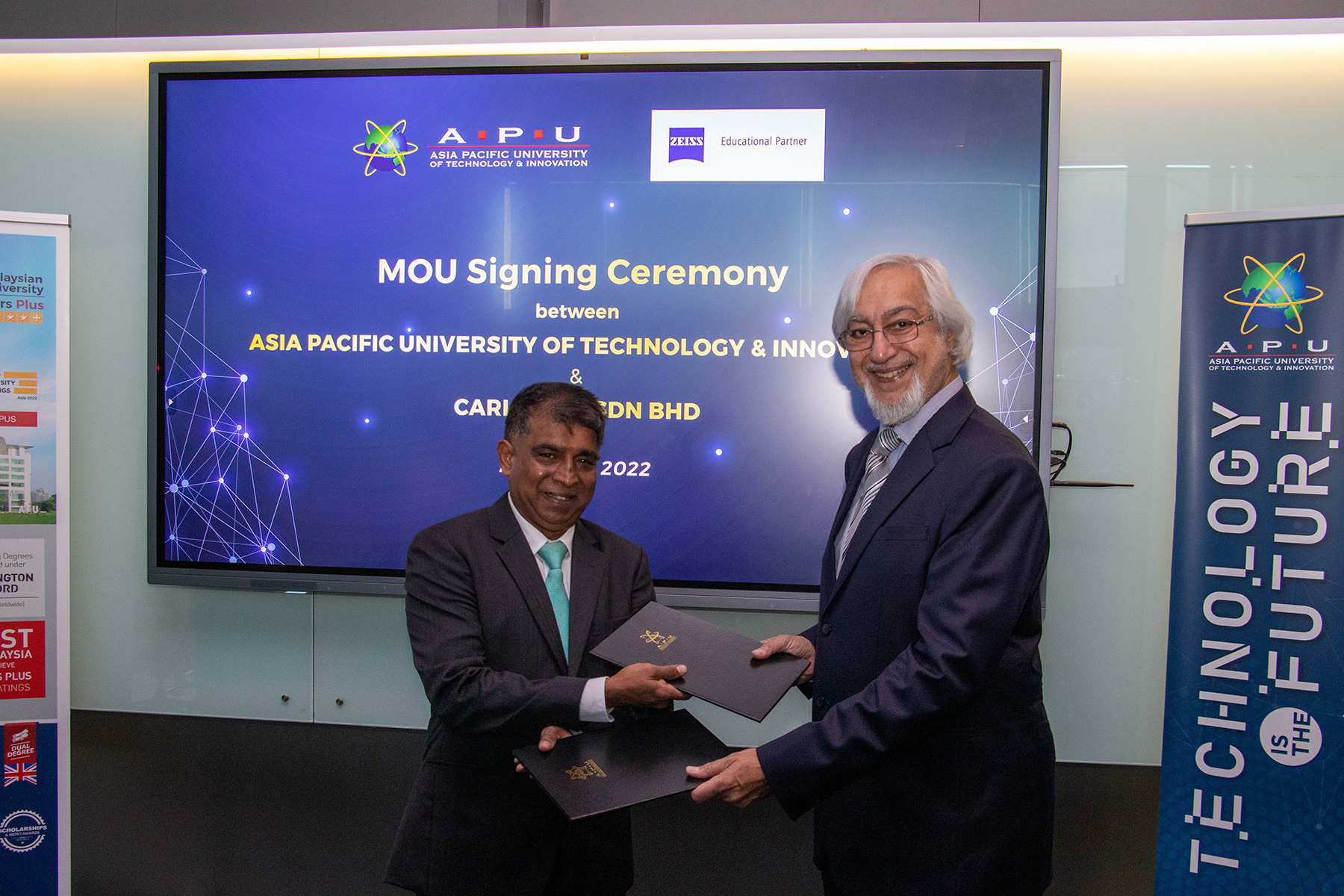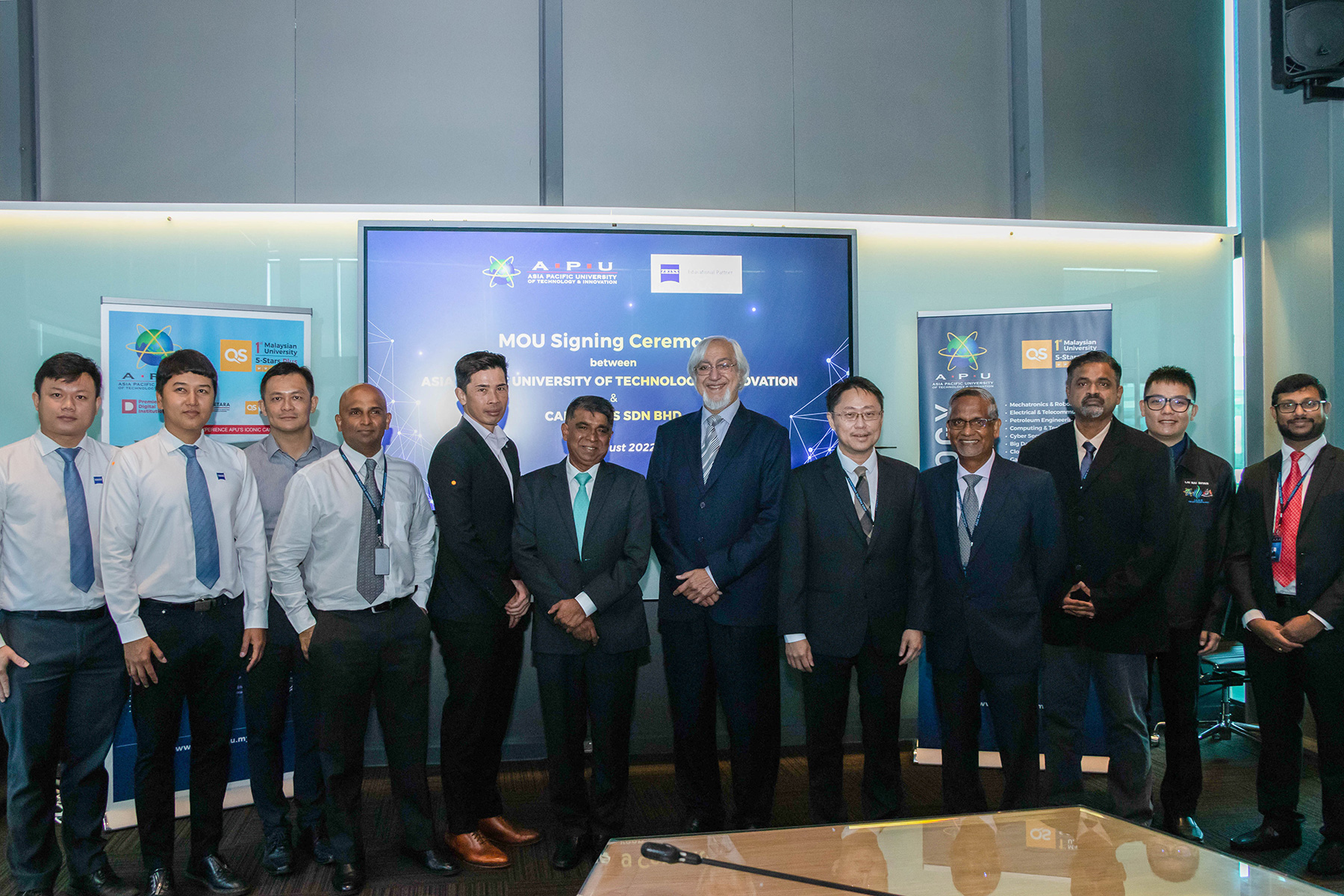You are here
Strategic University-Industry Collab Between APU And ZEISS
The first private university collabs with ZEISS to embed the latest inspection technology
With today’s precision manufacturing, understanding how to efficiently and accurately inspect parts, by mastering a contemporary skillset is critical for an engineering graduate's smooth transition into the workforce.
To equip students with the latest Geometric Dimensioning and Tolerancing (GD&T) skills, Asia Pacific University of Innovation & Technology (APU) set off as the first private university tapping into the expertise of ZEISS, a German-based internationally leading technology enterprise operating in the fields of optics and optoelectronics.
 Datuk Parmjit Singh (right), Chief Executive Officer, APU; and Mr. Ven Raman, Managing Director, Carl Zeiss Sdn Bhd, celebrating the newly formed industry-academia collaboration.
Datuk Parmjit Singh (right), Chief Executive Officer, APU; and Mr. Ven Raman, Managing Director, Carl Zeiss Sdn Bhd, celebrating the newly formed industry-academia collaboration.
Under this newly formed industry-academia collaboration, engineering students of all specialisations at APU will benefit by attaining a GD&T certification through associated modules embedded within the programme.
“ZEISS is the gold standard for quality control in dimensioning. By signing a memorandum of understanding, ZEISS will train our teaching staff on the basics of GD&T,” said Assoc. Prof. Ir. Dr. Siva Kumar Sivanesan, the Head of School of Engineering, APU.
“Subsequently, the skillset will be embedded in the first-year module across all engineering programmes, which will eventually be imparted to students for a better understanding of engineering drawing, and more importantly the principles of tolerancing when a dimension is assigned to a certain geometry,” he further explained.
The APU-ZEISS collaboration was formalised on August 24, 2022, by Datuk Parmjit Singh, Chief Executive Officer, APU; and Mr. Ven Raman, Managing Director, Carl Zeiss Sdn Bhd, at APU’s campus located at Technology Park Malaysia, Bukit Jalil, Kuala Lumpur.
ZEISS will help APU to introduce the latest inspection technology into the lab curriculum. Teaching staff will include the GD&T topic in a relevant engineering subject and include practical calypso offline simulation.
GD&T is a system for defining and communicating engineering tolerances and relationships. It uses a symbolic language in engineering drawings and computer-generated three-dimensional solid models that explicitly describe nominal geometry and its allowable variation.
Once honed in the right direction, it would enable students to perfect the technology of reverse engineering, allowing for more products to be produced in a shorter time. The certification also provides insights into current and relevant industry practices such as Failure Analysis and Root Cause Probing for part warpage or failure.
“This is an unprecedented move by the School of Engineering to equip students with future-proof knowledge and skills. With this, they will have an additional advantage in competing internationally, guided by experts from ZEISS,” stated Dr Siva on the agreement to send students to a metrology competition organised by ZEISS that indicates their learning outcome.
This interdisciplinary competition will involve robotics, computer vision, control engineering, and reinforcement learning, requiring students to hone their skills entrepreneurially and establish start-ups with suitable support and framework from ZEISS.
 Datuk Parmjit Singh (6th from right), Chief Executive Officer, APU; and Mr. Ven Raman, Managing Director, Carl Zeiss Sdn Bhd (6th from left) with representatives of both sides commemorating this collaboration with a group photo.
Datuk Parmjit Singh (6th from right), Chief Executive Officer, APU; and Mr. Ven Raman, Managing Director, Carl Zeiss Sdn Bhd (6th from left) with representatives of both sides commemorating this collaboration with a group photo.
Commenting on the collaboration, Datuk Parmjit Singh stated, “We are honoured that ZEISS is working with us, this relationship will be of mutual benefit as our students will develop skills from the expertise of ZEISS, and in return serve back the company. This is a fulfilling cycle of working together.”
Concurring, Mr Ven Raman concluded, “In any relationship like this, it needs to be a ‘win-win’ approach. Developing the necessary talents can only be done through a partnership. We are fortunate to have a partner to develop talents for the future of what we need for this country.”


